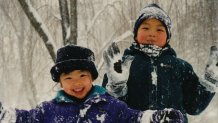When they were growing up competing and training for Olympic stardom, Alex and Maia Shibutani got used to being the only Asian Americans in the room.
While the U.S. sibling ice dancing duo was coming up in the skating world, they felt like they were missing out on stories about people who looked like them. Now, they're authors of a new book they hope will make a new generation of young Asian Americans feel seen.
Alex and Maia's book “Kudo Kids: The Mystery of the Masked Medalist” tells the story of Andy and Mika, who get to travel to Tokyo for the 2020 Olympics — and to determine the identity of the mysterious masked medalist.
More From NBCLX
Binge All of Season 2 of My New Favorite Olympian
How the World B-Girl Champion is Preparing for the 2024 Olympics
Two months before the Beijing Olympics, the duo known as the "Shib Sibs" spoke with hosts Ngozi Ekeledo and former Olympic speed skater Apolo Ohno to kick off Season 2 of the “My New Favorite Olympian” podcast.
In interviews, Maia, Alex, their literary agent Albert Lee explained how they got the story published. We also heard from New York Times bestselling children's book author Stacey Lee on why BIPOC perspectives are so important in children's literature, an industry where white voices and perspectives greatly outnumber everyone else.
Telling important stories
Throughout "Kudo Kids," the Japanese American experience is front and center. And that’s a big deal for Asian Americans who have not seen themselves in reflected in much literature, Maia Shibutani said.

“Representation is incredibly important because being represented and feeling represented is being acknowledged and being seen and validated and seen as equal,” she said. “It's a privilege to not have to worry about it because it means that you feel like you've already been represented your whole life.”
There has been a culture shift since the Shib Sibs' childhood: Television programming, for example, is finally becoming more diverse.
“For so many underrepresented communities, right now is a really special time where there's finally new material, whether it's books, movies, television shows, where people are finally feeling like they can see something that matches their own experience or perspective,” Maia Shibutani said.
Listen to Season 2, Episode 1 of My New Favorite Olympian here, and subscribe to the podcast
Since the Shibutanis' early days, U.S. Olympic teams are becoming more diverse too — in 2018, Asian American athletes made up half of the U.S. Olympic figure skating team.
But that progress toward a more welcoming, diverse media landscape comes in the face of hate. The Shib Sibs told NBCLX publishing and listening to AAPI voices during this time is especially important following a spike in violent attacks against members of the community during the coronavirus pandemic.
“I do think that it's really important to center the voices of Asian American people during this time,” Alex Shibutani said.
In children's literature, white voices have outnumbered others for decades
For decades, stories about white people have outnumbered books that reflect a growing nonwhite audience. And this disparity is particularly evident in children’s books.
Some 75% of the publishing industry is white, children's book publisher Lee & Low reported in 2020, and less than 15% of children’s books over the past two decades have contained multicultural characters or story lines, according to the University of Wisconsin Cooperative Children's Book Center.
That trend is starting to shift in winter sports, the Shibutanis are braving another overwhelmingly white space: the book industry.
The book industry’s diversity problem has lingered into 2021, seven years after a group of authors got together and declared “We Need Diverse Books.”
There are a lot of forces that limit the presence of minority and multicultural stories in books. There are publishing industry execs convinced multicultural stories won’t sell and others who give white creators the job to make multicultural content.
“There is a need for those stories,”says Stacey Lee, a young adult fiction author of multiple books, including New York Times bestseller “The Downstairs Girl.” “Some people may not realize it yet, but the readers know it. ... They're looking for these books.”
There have been more multicultural books in the past few years, but many are written by white authors, Lee said. And that doesn’t build acceptance and appreciation of other cultures. It can just reinforce stereotypes.
“It dehumanizes,” Lee said. “We don't have special powers. We're not like exotic lotus blossoms. We're not nerds or geeks.”
One of the ways the Shibutanis connect with their audience is through fun, nostalgic mentions of food. The book mentions tamagoyaki, karaage chicken, shrimp tempura and many other Japanese dishes.
“We also wanted to create more because we saw this gap in children's literature as far as representation, and we saw that there was just like there wasn't anyone else like us in skating,” Alex Shibutani said.
“We read Harry Potter and we read like a bunch of different types of fiction and nonfiction, sports autobiographies and stuff,” he continued. “But there wasn't a contemporary story for middle-grade young readers that featured Asian American kids doing fun and exciting things and solving mysteries and being heroes.”

